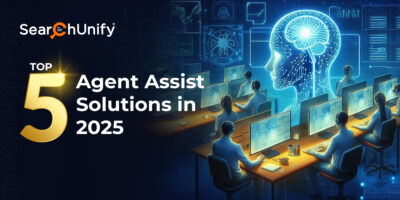
The current digital-first business environment proves that knowledge is the backbone of organizational efficiency and customer success, not just an asset. Meanwhile, Gartner predicts that by 2026, AI-powered knowledge management will reduce resolution times by 30%, making it a must-have for enterprises looking to stay ahead of the competition.
Simply put, enterprise knowledge management solutions go beyond simple documentation. They leverage AI, automation, and real-time collaboration to capture, structure, and enable easy retrieval of knowledge. And with the growing number of solutions available, choosing the best fit can be overwhelming.
That being said, let’s explore the best choice for your enterprise.
1. SearchUnify Knowbler
World’s first ML and Agentic AI-fueled Knowledge Management Solution empowering employees to create, review, and share knowledge within their workflows. Powered by advanced ML algorithms and Large Language Models (LLMs), it helps your enterprise capture, structure, find, reuse, improve, and optimize knowledge.
Some of Knowbler’s features are –
- GenAI-driven Auto-generation of Content
- Support for Rich Text Editor & Ability to Attach Multimedia Content
- Content Health Review and Analytics
- Auto-Indexing of Content in Pre-Defined Templates
- Knowbler Adoption Analytics
- KB data visualization
- Next Best Action prediction with LLM-fueled recommendation system
- Knowledge Duplicacy Flagging
- Control Over Knowbler-Generated Article Humanization
With Knowbler, Enterprises have been able to achieve up to 90% Faster Knowledge Curation, 100% Agent Participation, and over 80% Reduction in Time to Create New Knowledge.
2. Guru
Guru is an AI-powered knowledge management tool that embeds real-time, context-aware insights directly into enterprise workflows. By integrating with tools like Slack, Salesforce, and Zendesk, it eliminates knowledge silos and ensures teams have instant access to accurate, up-to-date information. Its AI-driven search, automated knowledge verification, and browser extensions enable seamless knowledge retrieval without disrupting tasks. With contextual recommendations and deep integrations, Guru enhances decision-making, streamlines customer support, and boosts productivity by delivering the right information at the right time.
3. Yext
Yext is a knowledge management platform that centralizes and updates business information across multiple digital channels, ensuring accuracy and brand consistency. By automating knowledge updates across customer touchpoints, it minimizes misinformation and enhances trust. Its AI-driven data consistency, multi-channel publishing, and performance analytics help enterprises maintain up-to-date, reliable content while optimizing engagement across platforms.
4. Bloomfire
Bloomfire is a collaborative knowledge management platform that promotes social learning and real-time knowledge sharing, helping enterprises break down silos and foster transparency. With AI-powered search, intelligent tagging, and an interactive UI, it enables quick information retrieval and enhances user engagement. Its built-in collaboration tools and content analytics further drive knowledge accessibility and team efficiency.
5. Document360
A knowledge base platform designed for detailed documentation and self-service support, helping enterprises reduce support requests by maintaining comprehensive, up-to-date knowledge. With rich content editing, version control, and AI-powered search, it ensures seamless content management and quick information retrieval. Its advanced analytics and feedback tools further enhance content accuracy and continuous improvement, making knowledge easily accessible and actionable.
6. ClickUp
ClickUp is a versatile productivity and knowledge management platform that combines documentation, task management, and collaboration in a single workspace. Designed for teams seeking an all-in-one solution, it offers customizable workspaces, structured templates, and seamless integrations with tools like Slack and Google Drive. With modular knowledge organization, workflow automation, and AI-powered suggestions for knowledge reuse, ClickUp streamlines operations and enhances team efficiency.
7. Zoho Desk
Zoho Desk is an AI-powered customer support solution that integrates a knowledge base to accelerate issue resolution. It equips agents with instant access to relevant information through AI-powered search while automating ticket classification and routing for efficiency. With omnichannel support, AI-driven content recommendations, and workflow automation, Zoho Desk enhances customer service by streamlining operations and reducing response times.
8. Salesforce Service Cloud
Salesforce Service Cloud is a CRM-integrated knowledge management system designed to enhance customer support with AI-driven insights. By centralizing customer data and knowledge, it enables personalized, proactive support. Its AI-powered recommendations surface relevant content instantly, while omnichannel integration ensures seamless customer interactions. With a built-in knowledge base, intelligent automation, and robust CRM connectivity, Salesforce Service Cloud helps enterprises deliver faster, more consistent support experiences.
9. Axero
Axero is an AI-powered knowledge management platform that unifies data sources, streamlines workflows, and enhances decision-making. By leveraging AI-driven search and automated content discovery, it minimizes time spent searching for information, boosting productivity and efficiency. With intuitive dashboards, automated workflows, and real-time analytics, Axero enables seamless collaboration and helps enterprises track content engagement for continuous improvement.
10. Confluence
Confluence is a wiki-style knowledge management tool that centralizes documentation and enhances team collaboration. It streamlines content organization with a flexible hierarchy, making navigation seamless. With real-time collaborative editing, AI-powered content organization, and deep integration with Atlassian’s suite of tools, Confluence ensures teams can efficiently create, manage, and share knowledge in a structured and accessible way.
Thus, choosing the right KM platform—whether Confluence for collaboration, Knowbler for AI-driven insights, or Salesforce Service Cloud for seamless CRM integration—depends on your enterprise’s needs and scalability. The right investment today turns knowledge into a growth driver.
Frequently Asked Questions
1. Why is enterprise-wide search important in knowledge management?
Enterprise-wide search ensures that users can access relevant information quickly across all departments and systems, making it a critical feature of effective knowledge management solutions.
2. Are cloud-based knowledge management solutions better than on-premise ones?
Cloud-based knowledge management solutions offer advantages like accessibility from any device, automatic updates, scalability, and lower upfront costs compared to on-premise systems.
3. What is the difference between a knowledge base and a knowledge graph?
A knowledge base is a centralized repository for storing structured information, while a knowledge graph connects data points across systems for deeper insights and context-aware search.
4. Can small businesses use enterprise knowledge management software?
Yes, many enterprise knowledge management software solutions are scalable and customizable to fit the needs of small businesses while enhancing collaboration and efficiency.
5. What should organizations consider when choosing a knowledge management tool?
Organizations should consider factors like scalability, ease of use, AI capabilities, integration options, and security when selecting a knowledge management tool.
6. How can businesses measure the success of their knowledge management strategy?
Businesses can measure the success of their knowledge management strategy using metrics like self-service success rates, knowledge reuse rates, agent adoption rates, and customer satisfaction scores.
7. Which industries benefit the most from enterprise knowledge management systems?
Industries like IT, healthcare, finance, retail, and education benefit significantly from enterprise knowledge management systems, as they rely on efficient data organization and real-time access to critical information.
8. What are the key features of the best enterprise knowledge management solutions in 2025?
The best enterprise knowledge management solutions in 2025 include AI-powered search, centralized repositories, seamless integrations, real-time analytics, and collaborative tools to enhance productivity and decision-making.














